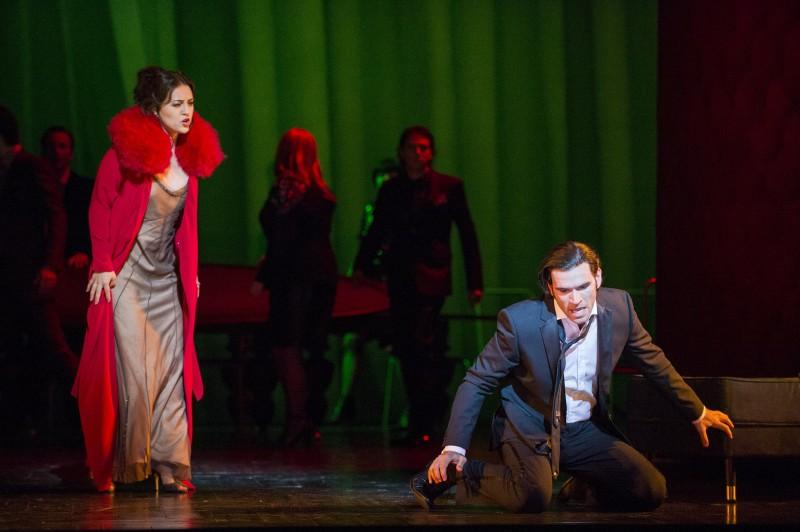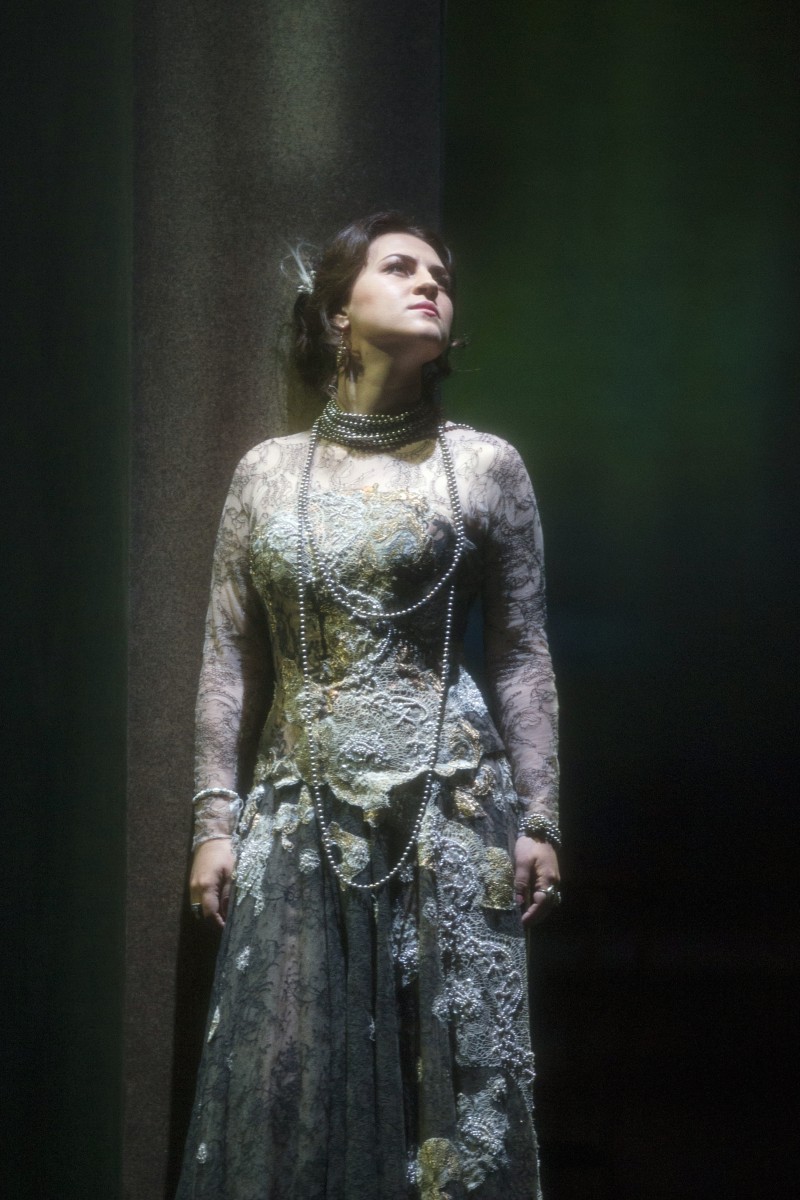La traviata, Glyndebourne | reviews, news & interviews
La traviata, Glyndebourne
La traviata, Glyndebourne
All musical elements fused to make great, stylish music drama of Verdi's intimate tragedy

Some of us have witnessed Traviatas where single stars were born: Angela Gheorghiu for Solti at the Royal Opera nearly 20 years ago springs quickest to mind. Some would claim a dream couple in Anna Netrebko and Rolando Villazon on peak form at Salzburg.
Mark Elder, conducting a London Philharmonic Orchestra responsive to each inflection, can take even higher credit at Glyndebourne than director Tom Cairns, whose layered, timeless response within Hildegard Bechtler’s tripartite, semi-abstract sets sometimes eluded me but who seems to be saying that even when happiness seems briefly so obtainable for two people, everyone – courtesan, lover and paternal pillar of unyielding society – is alone. But never coldly or impersonally so: Elder so painstakingly underpins every heartbeat, each of Verdi’s rhythms, bass lines and musical twists to the sorrow in the text that a stupendous tension, rather than just a deep sadness leading to the usual indulgent weepfest at Violetta’s last moments, informs the entire performance.
 For this the soprano, tenor and baritone need to be open to every nuance, and here they are; I’ve never seen a production so alive to all the emotional confusion and psychological complexity, if reluctant to provide easy resolutions. In Act One the finest flexibility seems to belong to Michael Fabiano’s Alfredo, out of his depth at a sophisticated party but determined to bare his soul, his love for the sick woman at the centre, in a context which would seem to forbid it.
For this the soprano, tenor and baritone need to be open to every nuance, and here they are; I’ve never seen a production so alive to all the emotional confusion and psychological complexity, if reluctant to provide easy resolutions. In Act One the finest flexibility seems to belong to Michael Fabiano’s Alfredo, out of his depth at a sophisticated party but determined to bare his soul, his love for the sick woman at the centre, in a context which would seem to forbid it.
Russian soprano Venera Gimadieva, in another Glyndebourne debut of stunning impact, doesn’t quite match him turn for turn in the Brindisi or flash out every semiquaver of diamantine brilliance in her determination to forget the possibility of devotion and to plunge into the vortex of Parisian social life (note how in the phrase “cross and delight”, he emphasises the agony, she in her later echo the pleasure). But a true coloratura Violetta won’t have the strength Verdi's Violetta needs to face the denigration of Alfredo’s father and the laceration of sacrifice. Perhaps the very highest notes lose the incredible fullness to which Gimadieva opens up as she rises, but the climactic cries of “love me, Alfredo” pierce the heart with full vocal weight and intensity.
Tassis Christoyannis, returning to cap his Glyndebourne triumph as the jealous Ford in Falstaff, portrays a man whose bluff certainty of what society expects founders very quickly on the reef of Violetta’s dignity. Father and “fallen woman” pace round each other warily and powerfully in a masterly portrayal of uncertainty and bewilderment, for which I guess we have Cairns to thank.
 While Gimadieva presses the right emotional buttons with her pianissimo singing at the core of the duet, as she is even more devastatingly to do in the big party-scene ensemble placed after the interval, Christoyannis (pictured left with Fabiano) also captures the right shades and colours expected of that rare species, the true Verdi baritone. Elder’s pacing allows him to sing the sentimental cavatina begging his son to remember family life in Provence in long lines which make as much sense as those of Violetta’s more swiftly paced “Addio del passato” in Act 3, a radical rethink which, as with the waltz-duet of possible happiness which follows it, takes some getting used to. And the furious response of Fabiano’s son to paternal self-regard, capped by wild jealousy when he learns where Violetta's gone, has an impassioned pressure which gives us glimpses of a possible future Otello in the young, infinitely sensitive lirico spinto tenor voice.
While Gimadieva presses the right emotional buttons with her pianissimo singing at the core of the duet, as she is even more devastatingly to do in the big party-scene ensemble placed after the interval, Christoyannis (pictured left with Fabiano) also captures the right shades and colours expected of that rare species, the true Verdi baritone. Elder’s pacing allows him to sing the sentimental cavatina begging his son to remember family life in Provence in long lines which make as much sense as those of Violetta’s more swiftly paced “Addio del passato” in Act 3, a radical rethink which, as with the waltz-duet of possible happiness which follows it, takes some getting used to. And the furious response of Fabiano’s son to paternal self-regard, capped by wild jealousy when he learns where Violetta's gone, has an impassioned pressure which gives us glimpses of a possible future Otello in the young, infinitely sensitive lirico spinto tenor voice.
 For once, this makes a powerful curtain to a first half which stops short of the Act Two finale. After the long supper break, Elder sends even the party dances ricocheting, with impeccably alert work as ever from the Glyndebourne chorus – the very small supporting roles are also cast from strength, chiefly the Annina of Magdalena Molendowska – and ignites the almost unbearable tension of the big encounter where Alfredo believes the love of his life has abandoned him for wealth and tinsel. Cairns underlines Violetta’s greatness of soul, and its powerlessness against bigger forces, by the way she forgivingly moves slowly towards the man who’s assaulted her, and then equally slowly back as the group around her edges in.
For once, this makes a powerful curtain to a first half which stops short of the Act Two finale. After the long supper break, Elder sends even the party dances ricocheting, with impeccably alert work as ever from the Glyndebourne chorus – the very small supporting roles are also cast from strength, chiefly the Annina of Magdalena Molendowska – and ignites the almost unbearable tension of the big encounter where Alfredo believes the love of his life has abandoned him for wealth and tinsel. Cairns underlines Violetta’s greatness of soul, and its powerlessness against bigger forces, by the way she forgivingly moves slowly towards the man who’s assaulted her, and then equally slowly back as the group around her edges in.
By the hour of her death the isolation is total against the now encroached walls, while the moment of greatest togetherness is underlined as the most desperate, its nihilistic message hammered home (“If you haven’t saved me by returning, no one on earth can do it”). I didn’t quite buy Violetta's final, lonely walk to a death – the mythic aspect worked better in Peter Konwitschny’s otherwise coldly calculating ENO production – but the roars of approval, the isolated attempts to get the whole house standing, which in my experience it never has, showed that this shattering work, with its pull between the sublime in the music and the bleak tragedy of the true-life story, had achieved its highest mark.
rating
Explore topics
Share this article
The future of Arts Journalism
You can stop theartsdesk.com closing!
We urgently need financing to survive. Our fundraising drive has thus far raised £49,000 but we need to reach £100,000 or we will be forced to close. Please contribute here: https://gofund.me/c3f6033d
And if you can forward this information to anyone who might assist, we’d be grateful.

Subscribe to theartsdesk.com
Thank you for continuing to read our work on theartsdesk.com. For unlimited access to every article in its entirety, including our archive of more than 15,000 pieces, we're asking for £5 per month or £40 per year. We feel it's a very good deal, and hope you do too.
To take a subscription now simply click here.
And if you're looking for that extra gift for a friend or family member, why not treat them to a theartsdesk.com gift subscription?
more Opera
 La bohème, Opera North review - still young at 32
Love and separation, ecstasy and heartbreak, in masterfully updated Puccini
La bohème, Opera North review - still young at 32
Love and separation, ecstasy and heartbreak, in masterfully updated Puccini
 Albert Herring, English National Opera review - a great comedy with depths fully realised
Britten’s delight was never made for the Coliseum, but it works on its first outing there
Albert Herring, English National Opera review - a great comedy with depths fully realised
Britten’s delight was never made for the Coliseum, but it works on its first outing there
 Carmen, English National Opera review - not quite dangerous
Hopes for Niamh O’Sullivan only partly fulfilled, though much good singing throughout
Carmen, English National Opera review - not quite dangerous
Hopes for Niamh O’Sullivan only partly fulfilled, though much good singing throughout
 Giustino, Linbury Theatre review - a stylish account of a slight opera
Gods, mortals and monsters do battle in Handel's charming drama
Giustino, Linbury Theatre review - a stylish account of a slight opera
Gods, mortals and monsters do battle in Handel's charming drama
 Susanna, Opera North review - hybrid staging of a Handel oratorio
Dance and signing complement outstanding singing in a story of virtue rewarded
Susanna, Opera North review - hybrid staging of a Handel oratorio
Dance and signing complement outstanding singing in a story of virtue rewarded
 Ariodante, Opéra Garnier, Paris review - a blast of Baroque beauty
A near-perfect night at the opera
Ariodante, Opéra Garnier, Paris review - a blast of Baroque beauty
A near-perfect night at the opera
 Cinderella/La Cenerentola, English National Opera review - the truth behind the tinsel
Appealing performances cut through hyperactive stagecraft
Cinderella/La Cenerentola, English National Opera review - the truth behind the tinsel
Appealing performances cut through hyperactive stagecraft
 Tosca, Royal Opera review - Ailyn Pérez steps in as the most vivid of divas
Jakub Hrůša’s multicoloured Puccini last night found a soprano to match
Tosca, Royal Opera review - Ailyn Pérez steps in as the most vivid of divas
Jakub Hrůša’s multicoloured Puccini last night found a soprano to match
 Tosca, Welsh National Opera review - a great company reduced to brilliance
The old warhorse made special by the basics
Tosca, Welsh National Opera review - a great company reduced to brilliance
The old warhorse made special by the basics
 BBC Proms: The Marriage of Figaro, Glyndebourne Festival review - merriment and menace
Strong Proms transfer for a robust and affecting show
BBC Proms: The Marriage of Figaro, Glyndebourne Festival review - merriment and menace
Strong Proms transfer for a robust and affecting show
 BBC Proms: Suor Angelica, LSO, Pappano review - earthly passion, heavenly grief
A Sister to remember blesses Puccini's convent tragedy
BBC Proms: Suor Angelica, LSO, Pappano review - earthly passion, heavenly grief
A Sister to remember blesses Puccini's convent tragedy
 Orpheus and Eurydice, Opera Queensland/SCO, Edinburgh International Festival 2025 review - dazzling, but distracting
Eye-popping acrobatics don’t always assist in Gluck’s quest for operatic truth
Orpheus and Eurydice, Opera Queensland/SCO, Edinburgh International Festival 2025 review - dazzling, but distracting
Eye-popping acrobatics don’t always assist in Gluck’s quest for operatic truth

Add comment